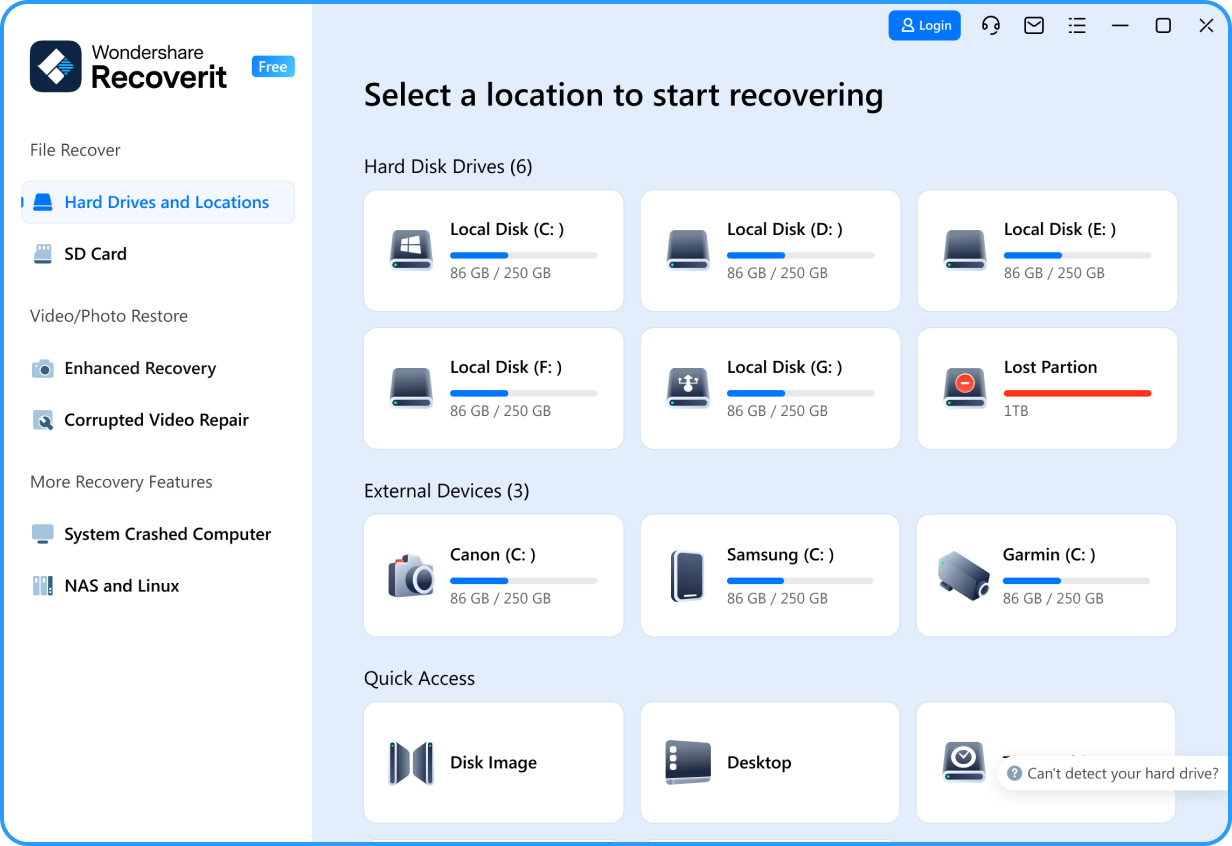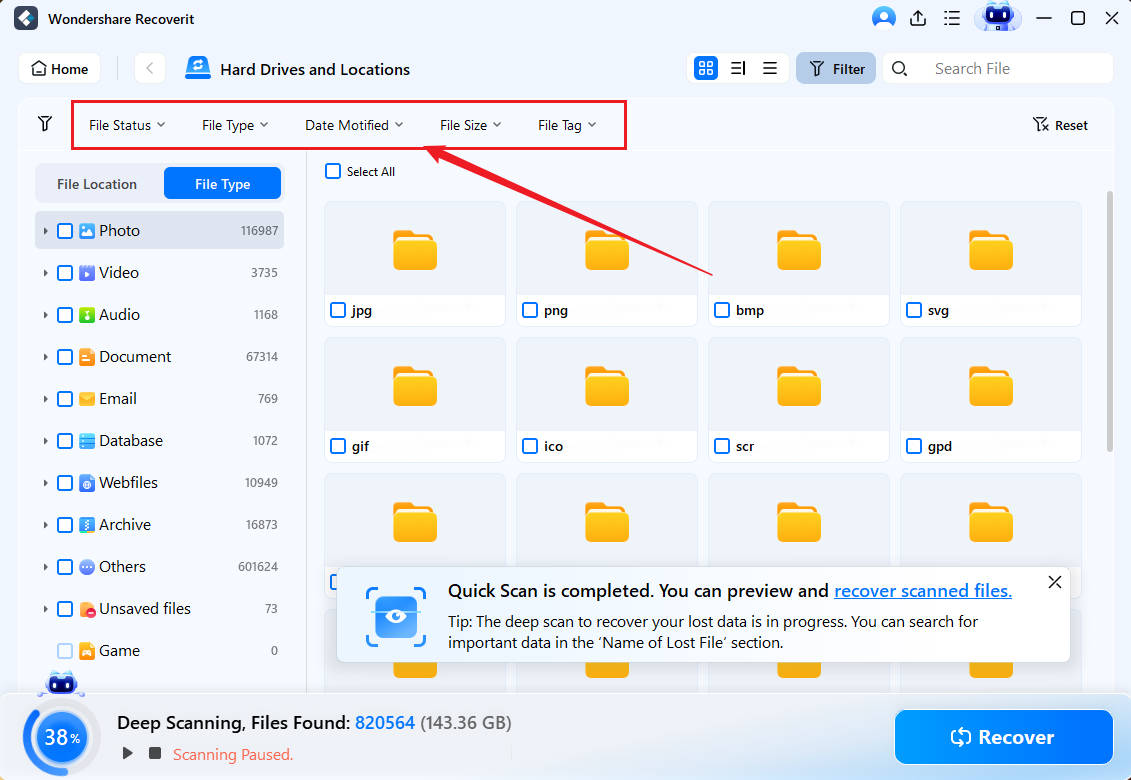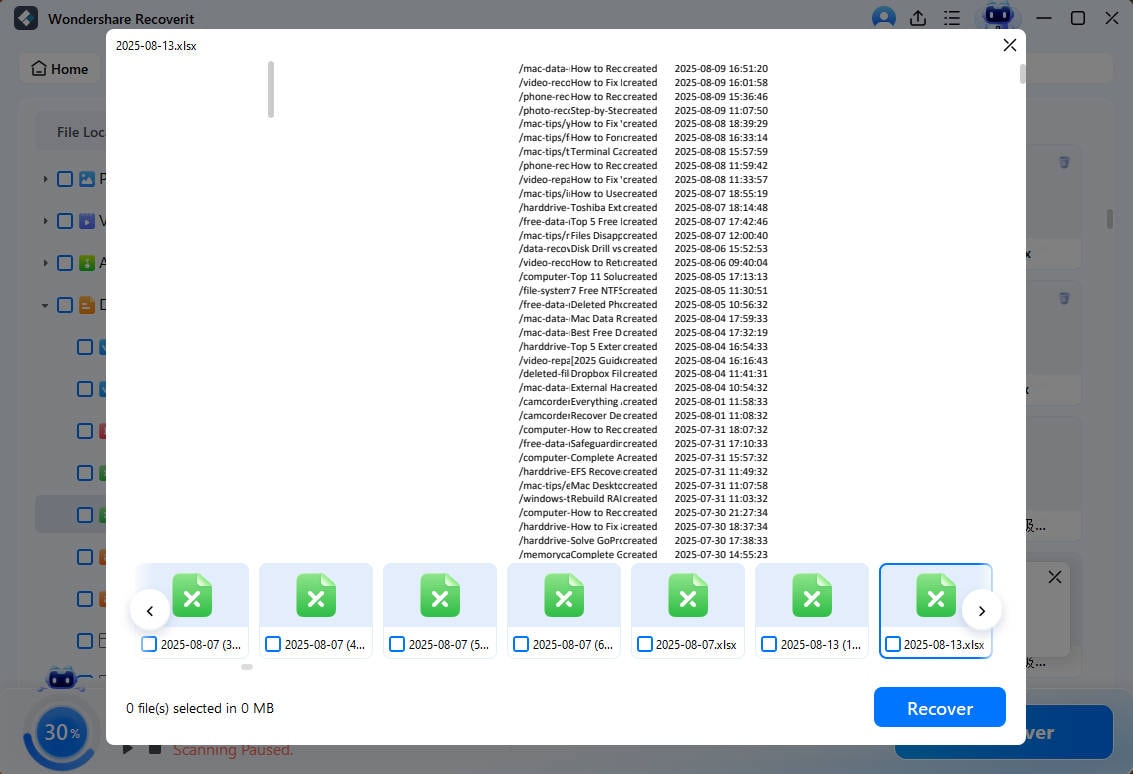When it comes to handling money data or sorting out information, Excel spreadsheets are very important to us. But what if you accidentally delete a file you needed or lose a lot of work because your computer suddenly stops working?
It can be really scary, but don't worry. Wondering how to open an older version of an Excel file? Well, there are ways to get back older versions of your Excel files.
This detailed guide will show you different ways to recover previous version of Excel file. Whether you want to get back an older version of an Excel file or return an Excel file to how it was before, we can help you. By the end of this article, you'll know how to look at the history of changes in an Excel file and get back an older version with confidence.
Try Wondershare Recoverit to Perform Data Recovery

In this article
Part 1: Is It Possible To Restore Previous Version Of Excel File?
The simple answer is yes, you can often bring back older versions of Excel files. Microsoft has included several tools and protections in Excel. This helps people get back earlier versions of their documents.
These ways include using built-in tools in Excel and features in Windows that keep track of file changes. There are also other software options from different companies that can offer more powerful ways to get back lost, changed or corrupted Excel files.
Part 2: How to recover previous versions Excel?
When it comes to recovering previous Excel version history, there are several methods at your disposal.
Let's explore these methods in detail, focusing on why each approach is useful and how it can help you restore your valuable Excel data.
Method 1: Use Windows "Restore Previous Versions" Feature
Windows' Previous Versions feature is a powerful tool that can help you recover earlier versions of Excel files. This method is particularly useful when you've accidentally overwritten an important file. Or if you made unwanted changes that you'd like to undo.
Why use this method?
- It allows you to access older versions of your file without relying on Excel's built-in features.
- It's helpful when you've saved changes you later regret and want to revert to a previous state.
- This method can recover files that were deleted or overwritten, as long as a previous version exists.
The Previous Versions feature creates shadow copies of your files at regular intervalss. This means you can potentially recover versions of your Excel file from different points in time.
Follow these steps to recover previous version of Excel file:
- Open File Explorer and navigate to the folder containing your Excel file. Right-click on the Excel file you want to restore. Now select "Restore previous versions".

- In the Properties window, click on the "Previous Versions" tab. Select the version you want to restore. Click "Restore" to overwrite the current file with the selected version, or "Open" to view the contents before deciding.

- If you choose "Open", you can save the previous version as a new file to avoid overwriting the current one.
By following these steps, you can easily retrieve a previous version of an Excel file and restore your work to an earlier state.
Method 2: Use Excel's Built-in Tool to Restore Excel File to Previous Version
Excel comes with its own version control feature that automatically saves versions of your work as you edit. This built-in tool can be a lifesaver when you need to restore an Excel file to a previous version.
Why use this method?
- It's integrated directly into Excel, making it easy and quick to access.
- It allows you to view and compare different versions of your file.
- You can recover unsaved changes or revert to earlier saved versions.
Excel's built-in version control keeps track of changes made to your file during a single editing session. This means you can recover work even if you forgot to save or if Excel crashed unexpectedly.
Here’s how to recover previous version of Excel file using the built-in tool:
- Open the Excel file you want to restore. Click on "File" and then "Info".

- Under the "Manage Workbook" section, click on "Browse Version History". A new pane will open on the right side of your screen, showing available versions. Click on a version to preview it.
- If you want to restore this version, click "Restore" at the top of the version pane. Excel will prompt you to confirm. Click "OK" to restore the selected version.
This method is particularly useful for recovering recent changes. It can help you easily compare different versions of your work.
Method 3: Use the AutoRecover Feature
AutoRecover is a feature in Excel that automatically saves what you're working on every so often. This can really help if you forget to save your work or if there's a sudden loss of power or computer malfunction.
Why use this method?
- It helps recover work that was never explicitly saved.
- It's useful for retrieving recent changes that might not be captured by other version control methods.
- AutoRecover can save your work even if Excel closes unexpectedly.
AutoRecover creates temporary files at set intervals (usually every 10 minutes by default). These files can be accessed to recover your unsaved work, potentially saving hours of effort.
Steps to recover unsaved Excel files from AutoRecover:
- Open Excel and click on "File". Select "Open" from the left sidebar.

- Click on "Recover Unsaved Workbooks". A new window will open showing any unsaved workbooks. Select the file you want to recover. Click "Open" to view the file. Once opened, immediately click "Save As" to save the recovered file with a new name.
By using AutoRecover, you can often retrieve work that you thought was lost forever, making it an invaluable tool for Excel users.
Method 4: Recover the Old Version of Excel File from .TMP file
Temporary (.TMP) files are created by Excel as backups while you're working on a file. These can be a last resort for recovering an old version of an Excel file when other methods fail.
Why use this method?
- It can recover versions of files that aren't captured by other methods.
- It's useful when you can't find your file through normal means.
- .TMP files can sometimes contain data from files that were never saved.
How it helps:
.TMP files act as a safety net, capturing snapshots of your work that might not be saved elsewhere. They can be particularly useful for recovering work from crashed sessions or corrupted files.
Steps to recover old version of Excel file from .TMP file:
- Open File Explorer and navigate to
C:\Users[YourUsername]\AppData\Local\Microsoft\Office\UnsavedFiles

- Look for files with the .TMP extension. Right-click on a .TMP file and select "Open with." Choose Excel from the list of programs. If the file opens successfully, immediately save it with a new name using "Save As."
If you can't find the .TMP files in the location above, you can also try searching your entire computer for .TMP files. Look for ones with recent modification dates.
By exploring these.TMP files, you might be able to recover versions of your Excel work that you thought were lost forever.
Video Tutorial: How to Recover Unsaved and Deleted Excel Files?
Part 3: Recover Earlier Version Of Excel Files with Best Data Recovery Software: Recoverit
For recovering previous versions of Excel files, sometimes you need a more powerful solution. . This is where specialized data recovery software like Wondershare Recoverit comes in handy.
Recoverit is a comprehensive data recovery tool designed to help users retrieve lost, deleted, or files. It can recover data from various storage devices. It's particularly effective when it comes to recovering earlier versions of Excel files. Especially the ones that might not be accessible through standard methods.
How Recoverit Helps In Recovering Earlier Versions Of Excel Files:
Recoverit employs sophisticated methods to search your storage devices for remnants of files that have been erased or replaced. It is frequently capable of retrieving Excel files that have been entirely removed from the Recycle Bin or lost due to mistakes in formatting.
This makes it a great choice when you need to bring back an Excel file from an earlier version that is no longer available using Windows or Excel's own features.
Key features of Recoverit for Excel file recovery:
- Detailed Scanning: Recoverit can thoroughly check your storage devices to locate any lost Excel files.
- Support for Different Formats: It can recover several types of Excel files, such as .xlsx, .xls, and .csv.
- View Before Saving: You can look at the recovered files before saving them, so you know you're getting the right version.
- Simple Interface: The software is made to be easy to use, even for people who aren't very tech-savvy.
- High Success Rate: Recoverit claims to successfully recover lost or deleted files up to 98% of the time.
Steps to recover earlier version of Excel file using Recoverit:
- Install Wondershare Recoverit on your computer. Launch the program and select the drive where your Excel file was stored. Click "Start".

- Once the scan is complete, use the file type filter to show only Excel files.

- Preview the recovered files to find the version you're looking for. Select the desired file and click "Recover" to save it to a new location.

By using Recoverit, you increase your chances of recovering earlier versions of Excel files that might otherwise be lost forever. It's a powerful tool to have in your arsenal when other methods of restoring previous versions of Excel files fail.
Part 4: Tips To Restore Excel File To Previous Version
Here are some tips to help you restore Excel files to previous versions more effectively:
- Enable AutoSave: Turn on Excel's AutoSave feature to automatically save your work at regular intervals. This increases the chances of having recent versions available for recovery.
- Use OneDrive or SharePoint: Saving your Excel files to cloud storage services like OneDrive or SharePoint enables version history, making it easier to restore previous versions.
- Create manual backups: Regularly create copies of important Excel files and store them in a separate location. This provides an additional safety net for recovery.
- Use descriptive image name: Include dates or version numbers in your image names, to make it easier to identify the correct version when recovering.
- Check the Recycle Bin: Before attempting more complex recovery methods, always check if the file you're looking for is in the Recycle Bin.
- Avoid saving over important files: When making significant changes, consider saving the file with a new name to preserve the original version.
- Set up File History in Windows: Enable Windows File History to create regular backups of your files, including Excel documents.
- Keep your software updated: Ensure that both Windows and Excel are up to date to benefit from the latest recovery and version control features.
By implementing these tips, you'll not only make it easier to restore Excel files to previous versions but also reduce the likelihood of losing important data in the first place.
Conclusion
Recovering previous versions of Excel files is a crucial skill in today's data-driven world. Whether you need to restore an Excel file to a previous version due to accidental changes, or you're trying to recover an earlier version of an Excel file after a system crash, the methods and tools discussed in this article provide a comprehensive toolkit for Excel users.
By regularly saving your work, utilizing cloud storage, and keeping your software updated, you can minimize the risk of data loss and make the recovery process smoother when it's needed.
Try Wondershare Recoverit to Perform Excel Recovery

FAQ
-
Q: How far back can I restore previous versions of Excel files?
The availability of previous versions depends on various factors, including your Windows settings and available disk space. Typically, you can restore versions from the past few weeks to months, but it's best to check your specific system settings. -
Q: Can I recover an Excel file if I didn't save it at all?
Yes, it's often possible to recover unsaved Excel files using the AutoRecover feature or by searching for temporary (.TMP) files. However, the success rate depends on how long you worked on the file and whether AutoRecover was enabled. -
Q: Is it safe to use third-party software to recover Excel files?
Reputable third-party software like Recoverit is generally safe to use. However, always download such software from official sources and be cautious about granting system permissions. It's also a good idea to run a virus scan on your system after using any new software.



 ChatGPT
ChatGPT
 Perplexity
Perplexity
 Google AI Mode
Google AI Mode
 Grok
Grok






















